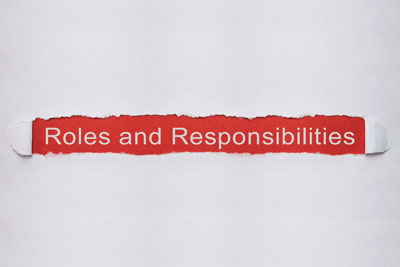Thoughts on Excellence Free E-Newsletter Series
Volume 19, Issue No. 3a
July 1, 2020
By Dan Coughlin

A team is a group of individuals who support one another toward achieving important goals and fulfilling a meaningful purpose.
One key to effectively supporting your teammates is to know your roles on the team, understand the responsibilities associated with those roles, and execute them as well as you can.
In sports or in a musical group this can be more obvious than in a for-profit or nonprofit organization. But the same principle holds in all these situations.
For example, being in customer service and talking with customers during moments of heightened frustration is a different role than establishing a three-year strategy for the entire organization. Both roles are enormously important, but each comes with it specific and different responsibilities. In order for the team to succeed, each individual has to know his or her role, understand the responsibilities associated with that role, and continually improve in the execution of those responsibilities.
Challenge Myths of Teamwork
Not every team member is rowing an oar, and not every team member should be rowing in the same direction. Some build the canoe, some repair the canoe, some determine the direction and speed the canoe should be moving in, some find ways to purchase canoes at a better cost, and some pull the oars. Not everyone has the same job, but everyone has a role with associated responsibilities, and everyone needs to execute those responsibilities as well as they can.
Another Level of Complexity
Where teamwork becomes even more complex is when roles are blurred and responsibilities are not clear. Let’s say you are having a company-wide meeting to discuss the past year and the next year. Everyone takes a seat. What role does each person have in the meeting? What is each person’s responsibility in that meeting? And how does each person effectively execute those responsibilities?
Is it okay for you to speak up and share your frustrations with your boss in front of the whole group? Not likely.
Is it okay for you to offer a suggestion on how to improve the customer experience? Maybe, but it depends on the context of the meeting.
Is it okay to speak up and offer a public shout out about the great performance of a teammate? That could set the tone for a more positive meeting, but it might not be appropriate in every meeting.
Is it okay to ask a clarifying question about the current strategy in order to execute more effectively in the future? Well, this might be a good time to get that clarity, but it also might show that you really haven’t been paying attention.
Is it okay to stay quiet for the entire meeting and not contribute anything? Perhaps, but you also might come across as a person who doesn’t care.
Steps to Become a More Effective Team Member
It’s an art, not a science, in terms of figuring out your roles, your responsibilities, and the best way to execute those responsibilities within your team.
I encourage you to ask yourself these three questions frequently:
- What is my role in this work situation?
- What is my responsibility?
- How can I execute that responsibility as well as I can?
And then I encourage you to review your performance by answering these questions:
- What did I do that was effective and why was it effective, and what did I do that was not effective and why was it not effective?
- What lessons did I learn or relearn from this situation?
- What will I do the same and what will I do differently in order to improve the execution of my responsibilities?
Republishing Articles
My newsletters, Thoughts on Excellence, have been republished in approximately 40 trade magazines, on-line publications, and internal publications for businesses, universities, and not-for-profit organizations over the past 20+ years. If you would like to republish all or part of my monthly articles, please send me an e-mail at dan@thecoughlincompany.com with the name of the article you want in the subject heading. I will send you the article in a word document.




